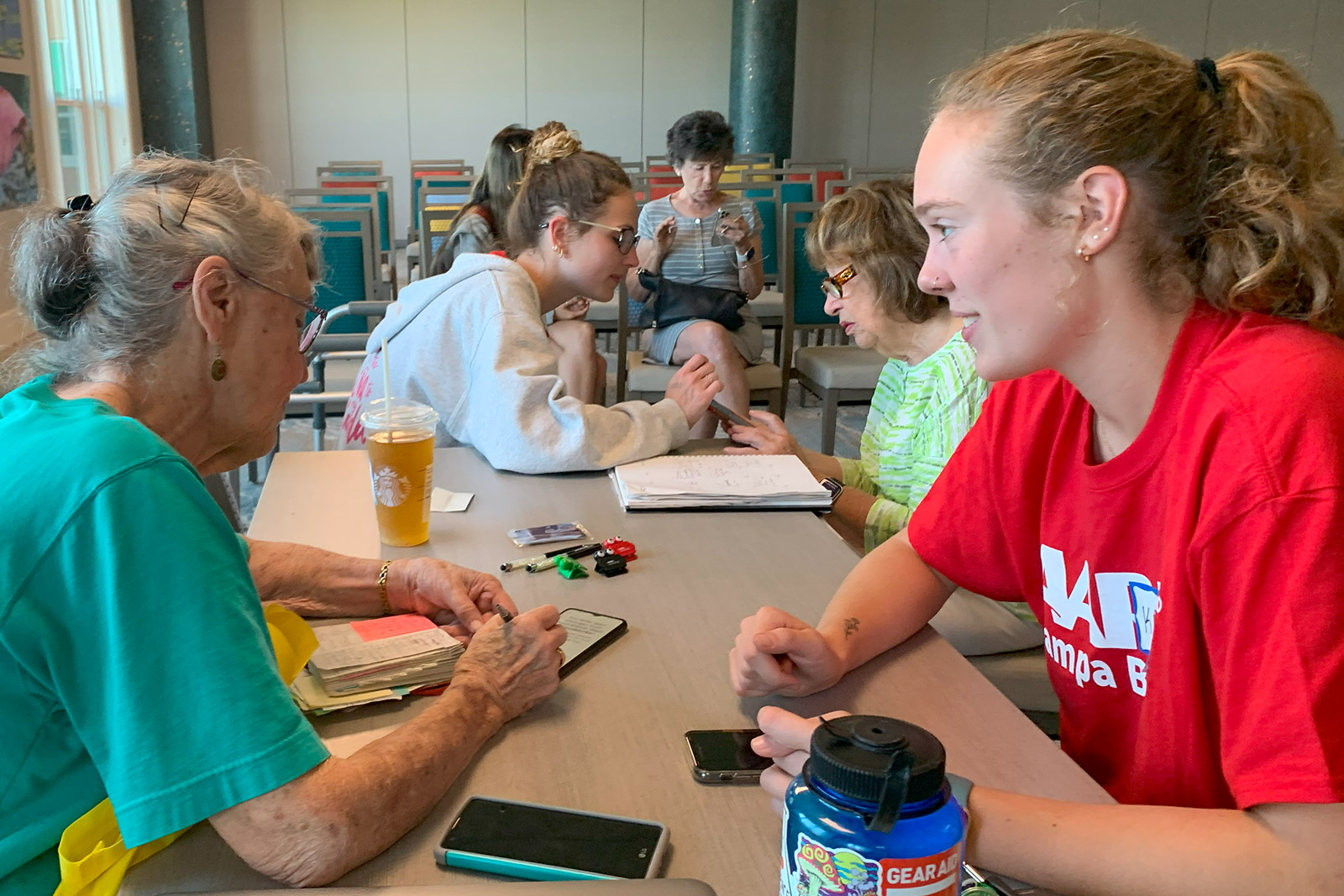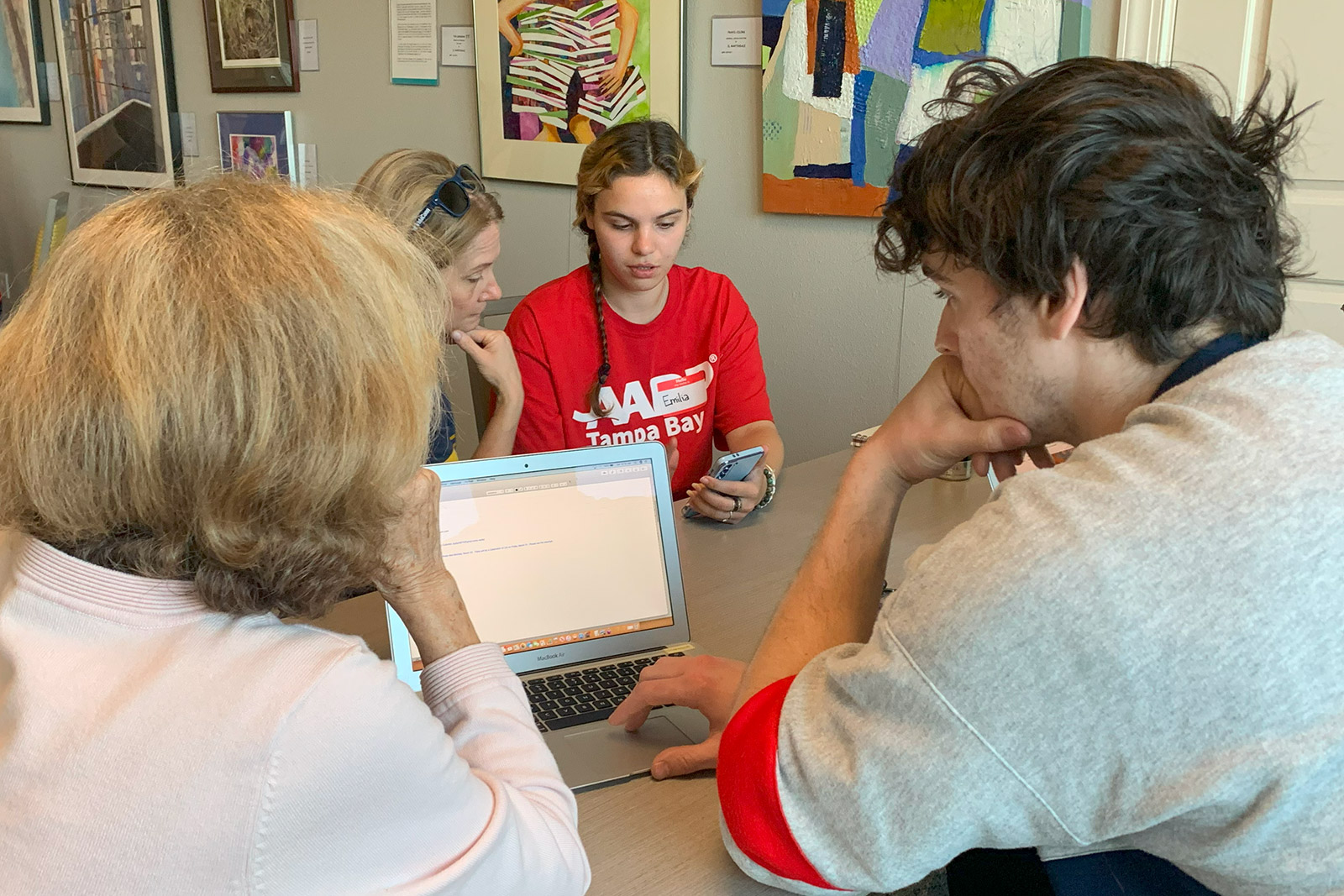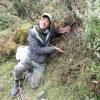Basil Worl, 93, a retired industrial engineer from Anderson, Indiana, is sitting in a conference room at Westminster Shores, a retirement and assisted living facility in St. Petersburg. It’s a recent Saturday morning and he’s surrounded by people quietly talking about emails and screenshots and QR codes.
Basil’s smartphone and a copy of Google Pixel 7 User Guide are on his lap. “Oh, I’m very glad I came here today,” he says. “I’m able now to get to my bank account from my phone so I can upload my checks. Hayden helped me. I got all my questions answered. He was excellent. And we hit it off really well.”
Basil was referring to Eckerd College junior Hayden Fleischer, a communication student from Hanover, New Hampshire. “I really enjoyed working with Mr. Worl,” Hayden says. “I got to listen to his life experiences and learn how much technology has changed just in the last few years. It’s second nature to me, but for him, it’s not. He was so grateful for the help.”
That is the essence of Mentor Up, a technology training program from the AARP Foundation that helps older adults navigate their electronic devices and brightens their day. Mentor Up has partnered with Eckerd College for the past six years to hold both remote and in-person workshops that pair Eckerd students with Westminster residents and AARP members. Tamar Shovali, Ph.D., associate professor of human development, is the guiding force behind Eckerd’s involvement in the program.
“I started talking to AARP because I wanted to begin a Reflective Service Learning program,” Shovali explains. “It turns out AARP’s field coordinator for Tampa Bay is Michelle Cyr, an Eckerd graduate. Michelle knew Eckerd students are special and would want to connect with older adults. I reached out to brainstorm, and this is what we came up with.”
Michelle Cyr ’02 grew up in Pinellas County and has worked for AARP for nearly 25 years.
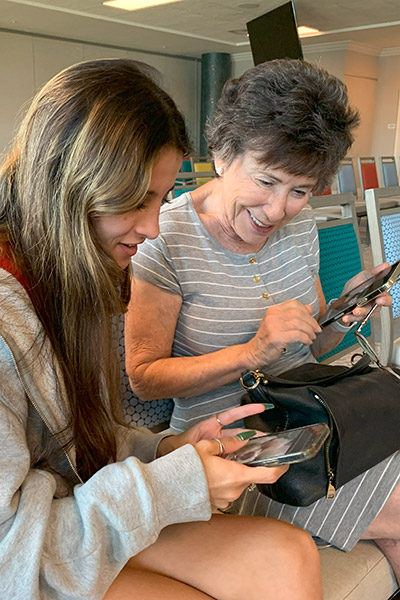
Sophomore Laila Saleh shares advice with an older adult in the program.
“We recognized that older residents were getting smartphones and tablets and iPads and were having a hard time figuring out how to use them,” Cyr says. “Even something like how to check their voicemail. It’s a bit of a learning curve. We often look to our elders for insight and consider them as mentors, but with technology, the roles are reversed.
“But seniors can learn just as much from younger people,” Cyr adds. “Think about it. What better way is there for an older person to learn how to use a smartphone than asking their kids or grandkids?”
Cyr and Shovali worked together to train the students, who are volunteers. During the thick of the pandemic, Shovali teamed up with AARP to offer a modified version of Mentor Up on Zoom. Five one-hour, one-on-one virtual technology training sessions led by 16 Eckerd students were held. Participants joined to ask questions about how to use features on their smartphones or how to navigate the Zoom virtual platform more effectively.
As the pandemic waned, it was back to in-person learning. This year, Shovali and about 15 of her students are offering six Saturday morning workshops from March to May. “I really feel it builds community,” Shovali says. “The lack of community, especially for older people during COVID, was very real. They came with the simplest questions. One woman asked how to change the background on her desktop. She wanted to change it to a piece of art and was so excited when she was shown how.
“The key to busting agism is intergenerational contact in a meaningful way. It’s not just about learning. It’s about getting to know each other, making friends.”
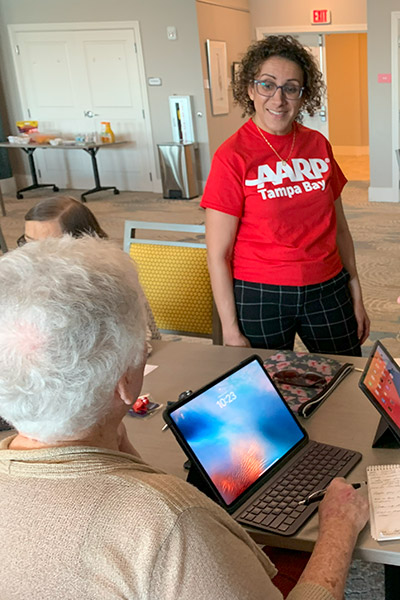
Tamar Shovali, Ph.D., chats with one of the program’s participants.
Back at Westminster, Lyn Dalzell, a retired physician’s assistant from West Virginia, is working with Kim Puopolo, a junior philosophy student from Sudbury, Massachusetts. “I wanted to put a link into an email, and Kim showed me how easy it is,” Lyn says. “And then Kim had me do it. It was very helpful.” Kim, sitting nearby, smiles and adds, “Each time I come here, I have great conversations and I learn a lot.”
Nadia Plechaty, a sophomore sociology student from Littleton, Colorado, spent much of her time helping Carol Dowd, an AARP member from nearby Tierra Verde, with her laptop. “The connection is my favorite part,” Nadia says. “Hearing about their lives, what they’ve done and the places they’ve been—it makes me feel like I’m doing something good for them besides helping them with their technology issues.”
Students are required to complete reflection papers following each session, “providing information about their session activities, an analysis of their experiences, and three connections to class material,” Shovali says. “It was clear from these reflections that students did not just serve as mentors to older adult mentees. Learning was mutual and, as in other intergenerational service learning projects, connection and respect toward older adults were formed.”
Shovali says she plans to offer the program again in the spring of 2025.





